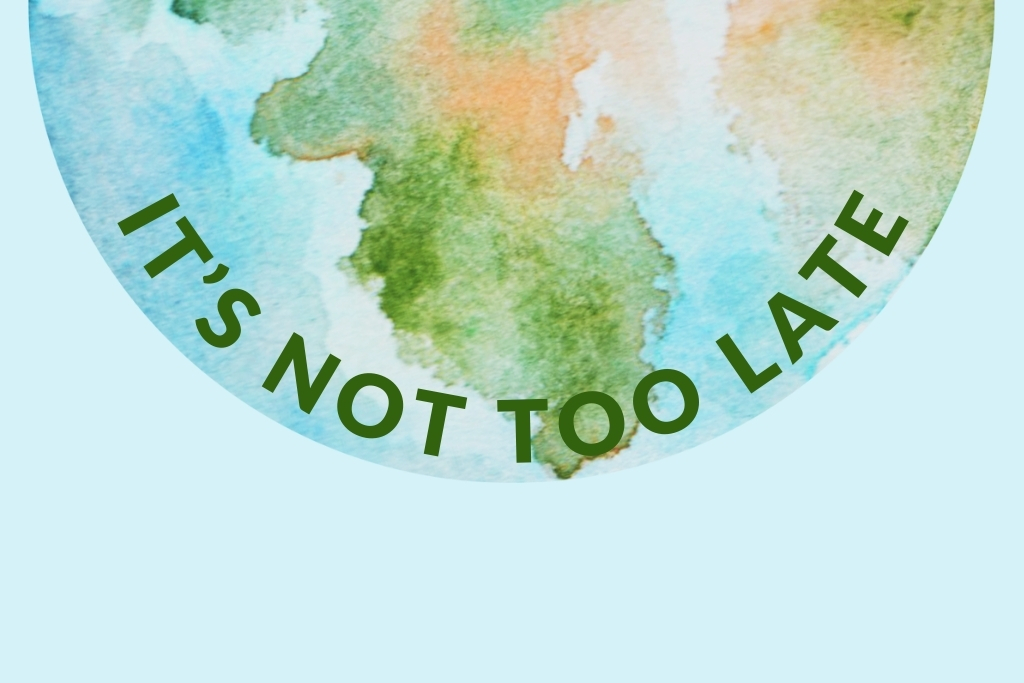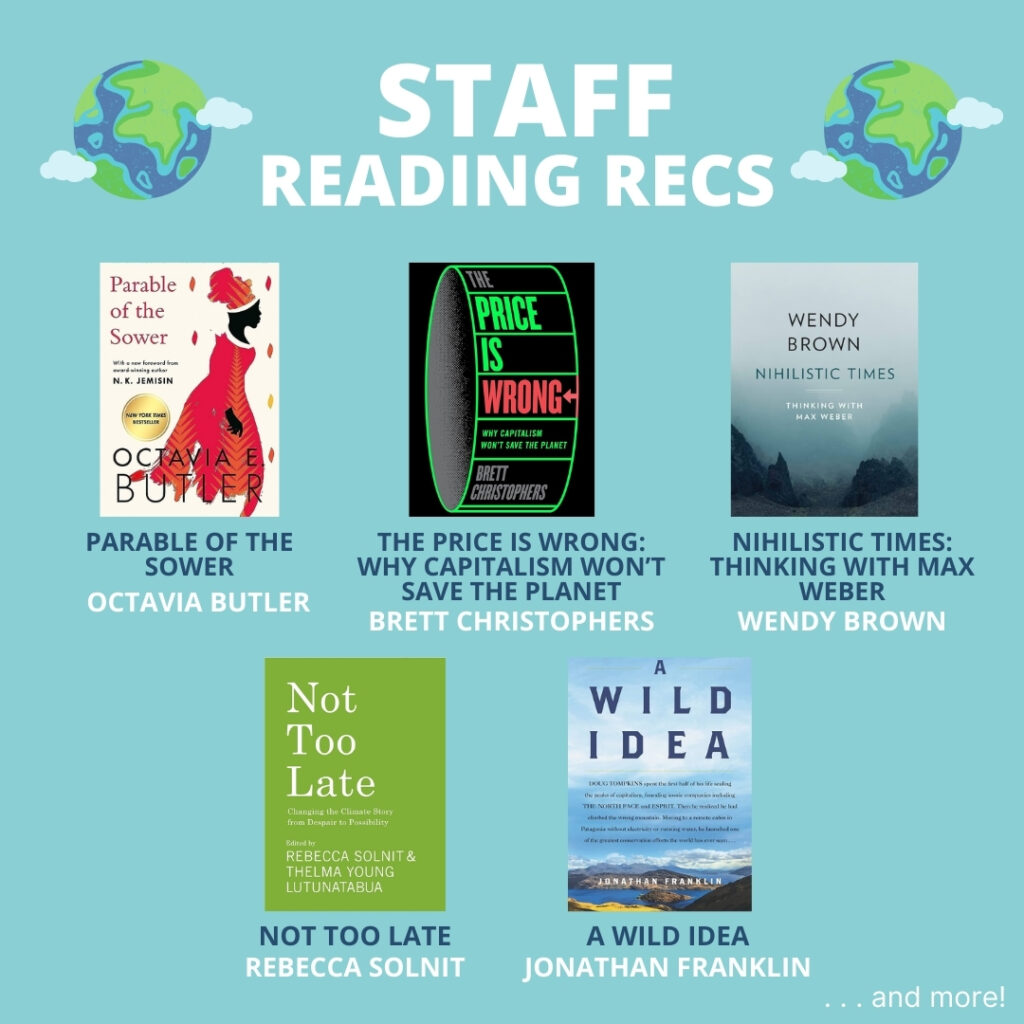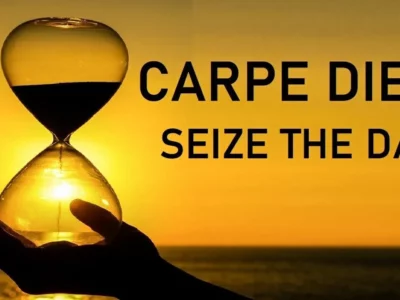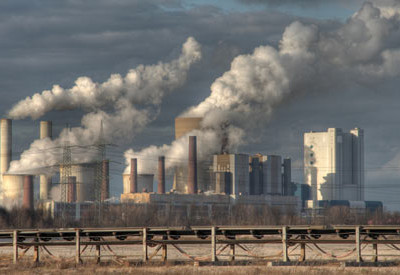Climate Action for Earth Day
“We have a long way to go, but we’ve started down the path.” I asked my UCLA Emmett Institute colleagues what climate actions give them hope on Earth Day. Here’s how they answered.

Don’t believe what you’ve heard. There is one single thing you can give up that will help address climate change: voter apathy.
One-third of eligible voters—80 million Americans—did not vote in the presidential election last time around. Why not? Because they just “weren’t registered” or they “weren’t interested in politics,” according to this Ipsos survey. It’s so much worse for local elections. Turnout in 10 of America’s largest cities was less than 15%, according to the Who Votes for Mayor project. In Dallas, just 6% voted in recent local elections.
Earth Day is a perfect day to register to vote and to make sure people in your life are registered—and fully aware of what’s at stake in Election 2024. The first Earth Day in 1970 saw teach-ins, walkouts, and demonstrations grab the participation of 20 million Americans—about 10 percent of the total U.S. population at the time. That mobilization contributed to the creation of the EPA and bedrock American environmental laws.
Earth Day is of course also the victim of egregious corporate greenwashing and PR marketing. Just ask any environmental journalist what it’s like to open their Inbox in April. Push that aside.
Most Americans have real questions and concerns about climate change that should be engaged with on a day like today. Americans are most interested in learning about solutions to the climate crisis. To be exact, 44% of those surveyed by the Yale Program on Climate Change Communications said that if they could talk with a climate expert they would ask about solutions. They wanted to know specifically: “Is there still time to reduce global warming, or is it too late?” And they asked, “What can the nations of the world (especially the U.S.) do to reduce global warming?” This may be why we’re seeing a recent embrace in books and movies of what the sociologist Dana R. Fisher calls “apocalyptic optimism.”
So, in the spirit of change-making this Earth Day, I asked my expert colleagues at the Emmett Institute what concrete actions and recent developments give them the energy to keep on going. Here’s what they said:
Ann Carlson: The Inflation Reduction Act: It’s actual action by Congress, pouring billions of dollars into developing climate solutions across multiple sectors and industries.
Ted Parson: The field experiment on Marine Cloud Brightening (one type of solar geoengineering) underway right now from the deck of the USS Hornet in Alameda, directed by Prof. Sarah Doherty of the University of Washington. The hope isn’t so much that this intervention method has a lot of promise, Marine Cloud Brightening is a mixed bag. The remarkable and positive thing is that it’s all going off so carefully, responsibly, ordinarily. They’re doing careful testing and assessment, at tiny scale and zero risk, on an intervention method that might help; they even got some prominent press coverage; and all the discussion is measured, rational, and civil. I think that’s a first.
Jason Gray: Progress is possible, but needs to happen everywhere. The data from 2023 demonstrates that countries can cut rates of tropical forest loss if they garner the political will to do so, and the countries that have accomplished this can provide lessons for others. However, past experience in Brazil shows that such progress can be reversed when political winds change.
William Boyd: There’s hope in the renewed embrace of industrial policy and increased public investment in the fight against climate change.
James Salzman: While it could be seen as a negative, I think the recent criticisms of carbon offsets will be good in the long run as they force greater credibility and rigor for the offsets going forward.
Cara Horowitz: US greenhouse gas emissions shrank in 2023, while our economy grew. That’s the first time this has happened since before the pandemic. We have a long way to go, but we’ve started down the path.
Alex Wang: Chinese grassroots environmental groups give me hope. They keep fighting for the climate and the environment, despite funding constraints and complicated political circumstances. (Three of the most prominent environmental advocates in China visited UCLA on Friday for a symposium.)
Ruthie Lazenby: Riding the bus! I’ve been committing to taking the bus as much as I can, including across town to campus. It takes a long time but has made me aware of how driving makes me feel more frantic and self-interested: looking for my parking spot, trying to make a light, missing my left turn because someone else is trying to make a light. On the bus I get to sit back, maybe send a few emails, and I feel more connected to the city and my fellow bus-riders.
Julia Stein: California’s legislature continues to be willing to grapple with the complex issues facing our environment and to lead the nation in testing solutions, whether it’s by making producers take responsibility for the waste they generate or by taking steps to check under the hood when it comes to corporate climate-friendliness claims. There are no easy solutions to many of our environmental challenges, but California lawmakers are having the necessary hard conversations and continue to advance the ball in the fight against climate change.
Sabrina Ashjian: There are lots of legislative and regulatory actions happening which provide hope. One is the recent EPA announcement of their finalized National Primary Drinking Water Regulation (NPDWR) which establishes Maximum Contaminant Levels (MCLs) of 6 PFAS (often called “forever chemicals”). They expect this rule will impact approximately 100 million people by preventing their PFAS exposure from drinking water. This will save countless lives.
Gabe Greif: We just wrapped up our final law clinic seminar for the semester and it was great getting to work with so many driven and passionate law students! It feels like I’m way too early in my career to be talking about the “new generation of lawyers,” so I’ll just say I had so much fun supervising such a resourceful and thoughtful group. Working with them definitely gave me some renewed hope for the future.
As for me, I have two thoughts. I’m heartened by state action plans. Forty-five states (including many red states) have filed Priority Climate Action Plans with the EPA for how they will attack pollution and boost clean energy in transportation and other sectors to take advantage of that IRA money. That’s 7,000 pages of action plans covering 90% of Americans with the real incentive of matching federal dollars to make them happen.
The other thing that I’m excited about is a game, Catan: New Energies! The new version of the world’s best board game, Catan, is about to make players wrestle with how to pursue growth and development while preventing deadly pollution. Climate storytelling and apocalyptic optimism in the form of family entertainment that builds problem-solving skills and spurs conversation? Yes, please.
Speaking of climate storytelling, here are our Staff Picks for reading this Earth Day.

Ann Carlson: Anything by Octavia Butler, including “Parable of the Sower” a dystopian novel published in 1993 but set in 2024 California.
Mary Nichols: The most surprising, interesting article I read recently was “Carbon accounting without life cycle analysis” from the journal Energy & Environmental Science. It attacks the idea that Life Cycle Analysis (LCA) is a useful way to create policy or make decisions on what to build or how to regulate to reduce climate risk. The argument is that the data are so weak, and the models so full of holes, that LCA may be worse than useless when making decisions about how to get to net zero carbon.
Danielle Anz: Not a current read, but I really enjoyed “Braiding Sweetgrass: Indigenous Wisdom, Scientific Knowledge And The Teachings Of Plants” by Robin Wall Kimmerer. Drawing on her experiences as an indigenous scientist, Kimmerer’s central idea is an awakening of a greater ecological consciousness requires a celebration and understanding of humans’ reciprocal relationship with the rest of the living world.
Malia Garcia: Scientists Confirm Fourth Global Coral Bleaching Event Across 53 Countries by Earth.org. I always knew that coral reefs are vital in maintaining our oceans’ ecosystems and biodiversity, but I did not realize how serious the impact of global warming is on our coral reefs and how rapidly reefs are disappearing.
Ted Parson: I’m just re-reading “Ending Fossil Fuels: Why Net Zero is not Enough” by our wonderful former Emmett Fellow Holly Buck. Like all Holly’s work, it’s bracing in its originality and clarity of thought, and manages a tone that doesn’t flinch from big challenges and hard choices while still remaining hopeful about human resilience and prospects.
Jason Gray: I’ve been reading Global Forest Watch’s Latest Analysis on Deforestation Trends, which compares 2023 to 2022 and earlier years. This shows more granularly where tropical deforestation has gone down (Brazil and Colombia most notably) and gone up (Bolivia, DRC, and Laos). It shows the challenges of really addressing deforestation – political/policy changes and command-and-control can help), but can be short-lasting if not paired with longer-term economic development.
William Boyd: Wendy Brown’s “Nihilistic Times: Thinking with Max Weber.” One of the great political theorists of her generation uses Max Weber’s famous essays on politics and science to diagnose our own nihilistic times and lays out a set of arguments for how we can redeem knowledge and politics to meet the challenges of the 21st century.
Cara Horowitz: Rebecca Solnit’s “Not Too Late,” a collection of essays from folks around the world working on climate solutions, from writers and scientists to policy wonks. The diversity and passion of the community of advocates on this issue brings me solace when I need it—as does the fact that many of our students will join this community and enrich it even further.
James Salzman: I am listening to Kim Stanley Robinson’s “Ministry for the Future” on my bike rides to campus. It may be the best known “Cli-Fi” work and is very effective in exploring what future politics and economics could look like.
Juan Pablo Escudero: I’d recommend Douglas Tompkins’ biography “A Wild Idea” by Jonathan Franklin. It is a story about a life dedicated to the earth and how hard it is to do that. It seems very appropriate for Earth Day.
Alex Wang: “Volt Rush” by Henry Sanderson is a great, quick read on the global race over EVs, batteries, and critical minerals.
Ruthie Lazenby: I picked up “Hope in the Dark” by Rebecca Solnit again recently. Solnit’s insistence on uncertainty and the unknowability of the future have been a welcome counterpoint to some of my more technical work.
Gabe Greif: I am making my way through “All We Can Save.” It’s a collection of essays, poems, and art written by women from all corners of the climate movement. So far, I’ve especially liked A Field Guide for Transformation by Leah Stokes, a professor who works on energy issues at UCSB.
Noah Fornataro: One climate related article that I recently found super interesting was by Politico titled “Biden vs. Trump: Do young climate voters care?”. The article was about young environmental activists pushing Biden to more greatly prioritize climate efforts.
Sabrina Ashjian: In honor of Dr. Jane Goodall’s 90th birthday, I started reading her Book of Hope: A Survival Guide for Trying Times. She’s also started a Hopecast Podcast which is on my list of items to listen to on my commute.
I’m reading “The Price is Wrong: Why Capitalism Won’t Save the Planet” by political economist Brett Christophers. While I’m not sure I totally agree with his thesis that we should take energy out of the private sector’s hand, the book is changing the way I think about how the U.S. goes about meeting our urgent climate goals.








Reader Comments